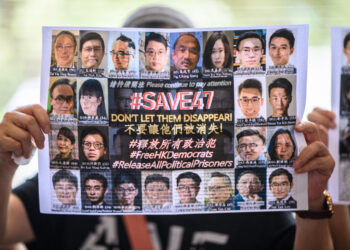
We Europeans are proud of our democracy. Yes, often, we complain about the existence of “obscure groups of power,” at least some do and perhaps we say “it is not a democratic country, a country where hospitals don’t work” or where “the right to study and work is not guaranteed.” There are reasons for these affirmations, to demonstrate a desire for more democracy, that is to say, participation, redistribution of wealth, opportunity. These are demands we believe in as well.
These aspirations are, however, on the whole “out of place” in most countries in the world. The other day I was talking with someone who deals with these issues and I was reminded that “democracy, as we know it, is not a widespread system, it concerns a minority of the world’s citizens: it exists in a large part of Europe, but not everywhere; it also exists in Africa but is extremely rare; it’s in Japan but is not common in Asia….On the American continent it does not exist in every state, and some, like Chile, have just begun to reach a democratic system.” It is the banality of democracy. We Europeans, the Americans, the Canadians, we are the richest countries of the world and, a bit for business and a bit because we believe, beyond tradable goods we even try to export democracy, ours, because who knows, even more could exist. Democracy as we know it was born, laboriously, in a world with its own characteristics with its own history and different from the rest of the world, where there is a religion that for centuries determined political developments – Catholicism, then overcome in many regions by Protestantism (and the first democracies were started there, where the Church of Rome was distanced). The rest of the world has other stories, overall, Catholics are a minority and must leave the constraints of other religions and different stories lived in other ways, probably building diverse democracies from ours. Because the path toward “participation, redistribution, and equal opportunity” and all the rest it brings, in our opinion, democracy is on the move in the majority of the rest of the globe ranging from Pakistan, where female students allow themselves to be killed to be able to attend university to the North African fight for food.
This is to reach the European Union and its role in the democratization of the world. Catherine Ashton’s role, whether she is up to it or not, is another story and is very complicated. Because the mission that the “good” west (which it really isn’t and many facts prove it, like the compliance with many dictatorships like the Kazak one in the news lately) has given itself is much more difficult than any hope. We must fight for the unknown, at times refused, maybe even rightly so, and live with the choice of “political realism” at any rate embarrassing.
Lorenzo Robustelli





![Il presidente dell'Eurogruppo, Paschal Donohoe, in audizione in commissione Affari economici [Bruxlles, 19 febbraio 2025]](https://www.eunews.it/wp-content/uploads/2025/02/donohoe250219-350x250.png)





